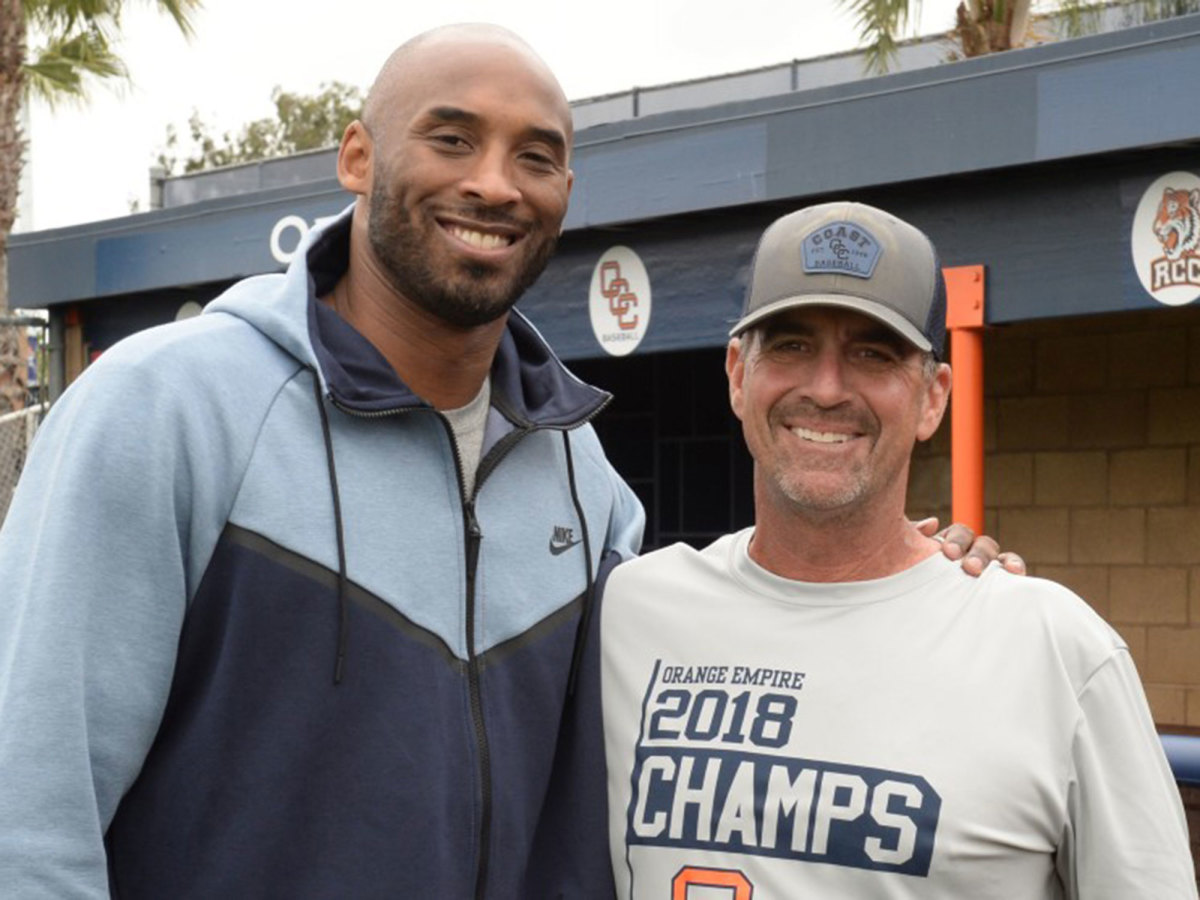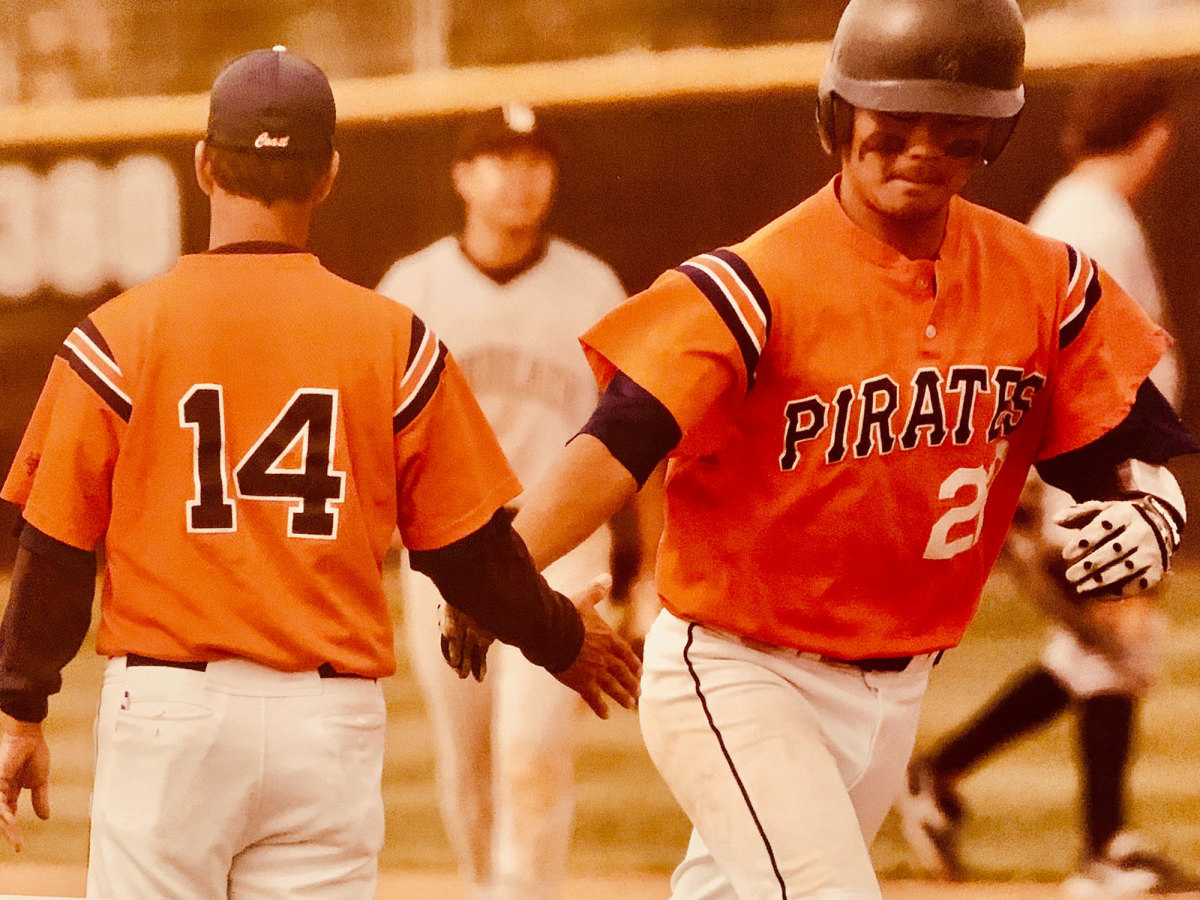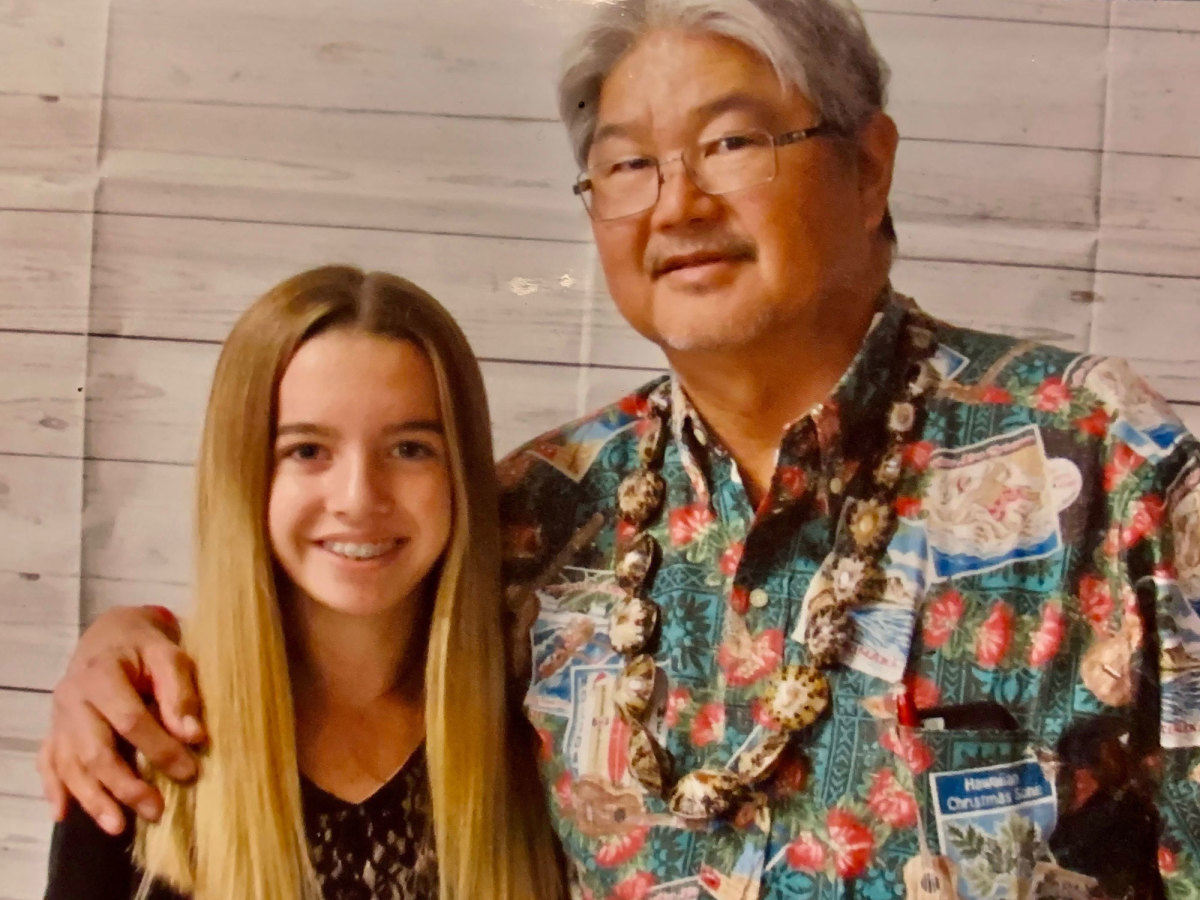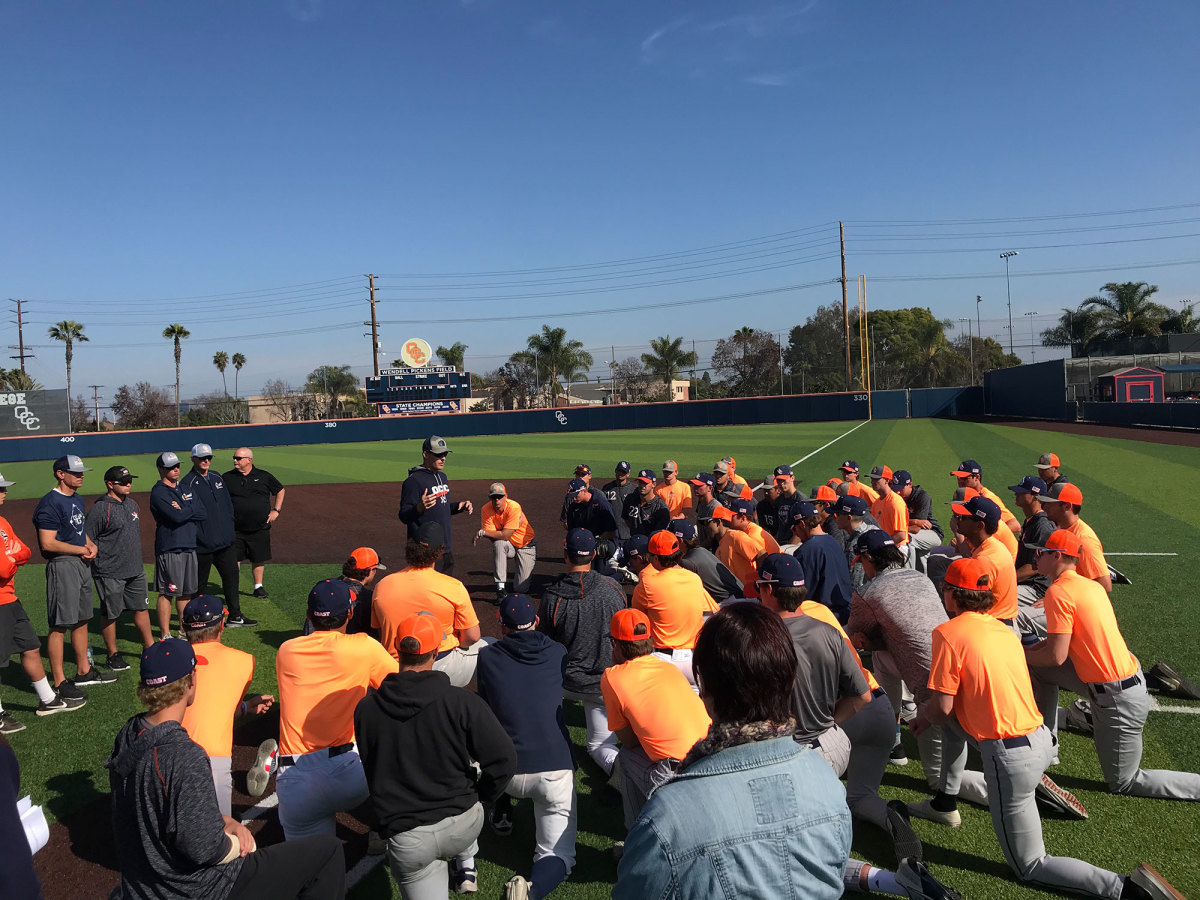The Story of John Altobelli and the Community He Helped Heal

COSTA MESA, Calif. — The morning after Orange Coast College baseball coach John Altobelli, wife Keri and their daughter Alyssa died in the helicopter crash that also killed NBA star Kobe Bryant, his daughter Gianna and four others, Kent Watanabe sat inside the baseball stadium where Altobelli had reigned for 27 seasons.
A gray-haired, 67-year-old man with a cane, Watanabe was seated on a bench near the front gate, a lone sentinel guarding what he and the other grief-stricken members of the OCC baseball family call “The House That Alto Built.” He was there to talk about Altobelli—known more commonly by his two-syllable nickname—and about the healing that Alto and his family had brought to Watanabe and his family over the preceding decade. But first he wanted to explain, with a hint of apology, that the reason he wasn’t crying was “because I physically do not have any tears left after yesterday.”
“He meant the world to us,” Watanabe continued as his wife, Annie, approached, wiping her eyes. “More than that. You can’t measure it.”
“Alto and his family picked us up, physically, mentally, emotionally,” Annie said, “and put us back together again.”

On Sale Now: Sports Illustrated's special Kobe Bryant Tribute Issue, celebrating the life and legacy of the Lakers icon.
Kent and Annie’s son, Jourdan Watanabe, was a tall, power-hitting catcher for Altobelli who earned all-conference honors as an OCC freshman in '08, batting .353 with seven home runs and 40 RBIs for the Irvine-based junior college. Jourdan chose to sit out the ’09 season, however, to deal with the lingering legal aftermath of an alleged street race that left another young driver dead and Jourdan facing manslaughter charges.
On March 31, 2007, according to an Orange County Register article that cited the district attorney's office as its source, “Watanabe and Han Huang … pulled up next to each other at a red light, gestured to each other, and quickly accelerated to more than 70 miles per hour in a 45 mile per hour zone. … [Huang] lost control of his car and hit a tree, flipping the car onto its roof. … Huang died at the scene.
“Authorities believe that Watanabe got out his car, saw the damage to Huang's vehicle, then drove home to park his car. … He returned to the scene of the crash on foot after friends told him that officers wanted to speak with him.”
The manslaughter charge followed, along with a civil suit brought by Huang’s parents. Nearly two years after Huang’s death, both legal matters remained unresolved and were weighing heavily on Jourdan’s mind, according to his friends and father. Not to mention that he had witnessed the death of a kid his own age.
Published reports about Watanabe’s death—which came two years after Huang’s— provided little clarity as to how it happened. The details the Irvine police gathered remain cryptic. At 1:00 a.m. on Feb. 27, 2009, officers responded to a burglar alarm at a local business, where they found the front window smashed in and Watanabe bleeding from multiple lacerations. Citing police records, news accounts stated that Watanabe was conscious and that he told officers he was “on drugs.” (A toxicology test later found a common allergy medication, along with THC, the psychoactive ingredient in cannabis, in his system.) Watanabe died of blood loss at a local hospital later that morning. How he ended up in that store, and how its windows were shattered, remained unconfirmed, although there was no shortage of speculation.
Among the first to arrive at the Watanabe home that morning was John Altobelli, who didn’t care how Jourdan had died, only that he was gone. “He was more than supportive,” Kent recalled, sitting in the stadium last Monday. “He was like a guardian for our family, and it went on for years.”

The confounding death of Jourdan Watanabe 11 years ago raised the same question that was asked last week regarding Bryant, the basketball icon who died with the Altobellis on Jan. 26.
How important is the way society remembers a person, as compared with his loved ones’ need to mourn him in peace, with only good memories in mind?
Both mainstream and social media reminded us about Bryant’s 2003 sexual assault case, which was dropped, and civil suit, which was settled, stoking emotional responses to the question above.
In the wake of such a tragedy, is it appropriate to mention the decedent’s most compromising moments—and in Bryant’s case, to acknowledge there was a survivor to whom he issued an apology and a financial settlement? If not, when is the appropriate time? A week later?
A month?
Should society wait that long for the glowing write-ups and musical montages about Bryant to fade away before mentioning his darkest chapter?
Should society at least allow his remains to be interred first?
John Altobelli wasn’t interested in parsing the details of Jourdan Watanabe’s death or his level of culpability in that fatal car crash two years earlier.
Alto didn’t merely put a No. 22 patch on OCC’s jerseys for the remainder of that ’09 season, he painted Jourdan’s number behind home plate, on the outfield wall and on the slope behind the pitcher’s mound. Eleven years later, there are 22s plastered all over Wendell Pickens Stadium—on the stone facade where visitors enter the ballpark, on the orange-and-blue flags that flap overhead, and on every player’s backpack. At one point Altobelli had a massive 22 painted on the asphalt alley just outside the stadium, but workers paved over it a couple of years ago. (Alto wasn’t happy with those workers.)
OCC baseball team mourning loss of coach John Altobelli in helicopter crash that killed Kobe Bryant. pic.twitter.com/KqwP0xZVG1
— Mike DiGiovanna (@MikeDiGiovanna) January 26, 2020
For 10 seasons, no OCC player wore the number. It was Altobelli’s way of honoring the barrel-chested backstop who had been known within the OCC baseball family for his sense of humor and clubhouse shenanigans. Last season, to mark a decade since Watanabe’s death, Altobelli wore it himself. In previous years he wore 22 when managing the Brewster Whitecaps of the Cape Cod League (where he coached a young Aaron Judge and Jeff McNeil), and as an instructor with USA Baseball. His son, J.J. Altobelli, wore 22 from ’10 to ’13 as a University of Oregon shortstop. His two daughters wore it in various youth leagues. The double deuce was practically etched in the Altobelli family crest. The devotion to J-Wat’s jersey number, inside OCC’s ballpark and inside the Altobelli home, said that the discomfiting details of his last two years of life didn’t matter. He was gone. They loved him. That’s it.
Perhaps the only knock against John Altobelli is the season he was ejected from three games for arguing with umpires. He was punished with a suspension that forced him to miss the 2009 junior college state championship tournament in Fresno.
His Pirates won that ’09 title with Alto looking on from the stands, and without the catcher who had starred for them the previous season. Jourdan Watanabe died three months before his teammates raised the trophy and ordered their jewel-encrusted rings (with FOREVER A PIRATE, J-WAT 22 glittering on one side). Jourdan’s death, Alto believed, fueled that championship run. It was OCC’s first title since 1980, and the first of four that Altobelli would win at the junior college. Watanabe’s death also brought about the greatest generosity that Altobelli ever provided anyone.
“Alto, the baseball family, when Jourdie died they gave me bruises on my arms from being hugged so much, and both my shoulders were wet with tears,” Annie recalled last week. “Alto would cry and cry and cry. Keri, she was always there pushing me along, ‘Come on, Annie! Come on, you can do this!’ Calling me saying, ‘Get over here, let’s go out to dinner!’ I did not want to go anywhere.
“That’s the kind of people they were.”

Altobelli pulled Annie out of her depression’s deepest valley by placing her in charge of the snack stand. He endowed an annual scholarship in Jourdan’s name. (The 2019 recipient, Chris Ceballos, used it to aid his transfer to Kansas State, where he is the starting catcher.)
Kent, a traveling shoe salesman by trade, sustained a ruptured brain aneurysm in a Portland, Ore., department store about a year after Jourdan died. Altobelli, who happened to be in Eugene watching his son, JJ, play, received a frantic call from Annie and was the first one to arrive at the hospital. Traveling with him was his younger daughter, Alyssa (Gianna Bryant’s future teammate on Team Mamba). To say that the Altobellis never left Kent’s side after that is barely an exaggeration.
Kent’s brain aneurysm left him in serious condition for weeks and brought on a grueling recovery that forced him to retire early and rely on his cane to get around. “Alto was there every bit of the way,” Kent said. “He was part of our family. He made everything easier for us. … He knew that I did hitting training with little kids, so he said, 'Why don’t you do it for the team here?’ I said, ‘Alto, I coach little kids, I don’t coach college players.’ He said, ‘Just do what you did for Jourdie.’ ”
And so, since 2011, Kent has lobbed soft-toss to OCC’s hitters while stressing the importance of the link between their eyes and hands. That was his main teaching point when he and five-year-old Jourdan used to carry their bucket of balls across the street and whale away at Paseo Park until after sundown. Their neighbors, eight houses away, were the Altobellis. The two families weren’t close back then, but years later, when Alto found himself in need of a catcher, the connection flickered. “Alto said he remembered hearing Jourdie practicing,” Kent said, as Annie mimicked the sound of an aluminum bat doing its work: “ping, ping, ping.”
“When we had to sell our house because [Kent] was disabled and couldn’t work,” Annie said, “I didn’t want to pack up all of Jourdan’s stuff. Keri came running over, ‘Annie, get all those trophies, put them in the box!’ ” And here Annie breaks down into heaving sobs again, the kind you can’t control.
“She packed everything up, her and her two girls, brought it all to the new house,” Annie said. “If it wasn’t for them, I wouldn’t be here. They kept me alive.”
***
On Jan. 25, 2020, the day before the helicopter crash, OCC held an intrasquad scrimmage and fundraiser. “Annie and I ran the snack bar,” Kent recalled. “We sold a lot of team apparel. Made a lot of money. It was a record-breaker.”
“Alto was so happy that he ate two of my hot dogs,” Annie said. “He never ate hot dogs. He always ate healthy.”
Altobelli chatted with one of his closest friends, assistant coach Tim Matz, while their orange-and-blue-clad players competed against one another on the field. “He said, ‘Alyssa’s got this basketball tournament in Thousand Oaks tomorrow,” Matz recalled, his chin twitching with emotion. “He was dreading the drive. His phone buzzed. It was Kobe. [Altobelli] was like, ‘Sweet. Kobe’s taking us in the chopper.’ ”
Kobe and Alto and Keri and their basketball-playing daughters convened with another Mamba teammate, Payton Chester, and her mom, Sarah, the next morning. Bryant’s trusted pilot, Ara Zobayan, who had flown the former Lakers star to countless games during his NBA career, pulled the throttle and lifted the Sikorsky S-76B off the tarmac at John Wayne Santa Ana airport at 9:06 a.m.
It is with a shattered heart that we announce the passing of longtime head baseball coach John Altobelli, who died on Sunday in a helicopter crash, along with his wife, Keri and youngest daughter, Alyssa. https://t.co/3fjndZDzXD pic.twitter.com/cWFch9H4SV
— OCC Athletics (@OCCAthletics) January 27, 2020
About an hour later, Kent Watanabe received a call from one of his fellow OCC assistant coaches. The news was unfathomable. His first instinct was to go to the ballpark. Then he remembered Alexis, the Altobelli’s 16-year-old daughter, whom he suspected was sitting at home by herself. When Kent and Annie arrived, 29-year-old JJ was already there, having broken the news to his sister before she could learn about it on TV or her phone.
“We stayed there from morning until late last night,” Kent said. Lexi’s friends trickled in, filling the Altobelli home with confused, anguished young faces. Kent left to get smoothies for everyone, and later called in a dinner order from Lexi’s favorite Mexican restaurant, Mi Casa.
The next morning he was at the stadium, hunched over and out of tears. Alto’s ballplayers staggered in, their eye sockets red, their chests twitching with barely restrained emotion, embracing Watanabe, their weeping turning the shoulders of his bright-orange OCC shirt the color of rust.
Annie walked around the ballpark handing out bottled water, remembering too vividly the way that crying can render mourners dehydrated.
“Annie and I, we are reliving Jourdan’s passing,” Watanabe said. “To go through it once, [then] to have that same feeling again, for another family, the family that helped us heal, the family that was continuing to heal us, it’s overwhelming.”
Back when Jourdan died, in the days before John Altobelli permanently wrapped his family and his baseball program around the Watanabes, Kent decided to return to his native Hawaii, “and kind of give up and just become part of the scenery. But he gave me a role here.”
“He and Keri gave us life,” Annie said.

Back then, Alto gave everyone he met a plastic bracelet with "J-WAT #22" on it. This was back when Lance Armstrong’s shameful doping regime was just an allegation and his yellow LiveStrong bracelets were on everyone’s wrist. Nearly every member of the OCC baseball family, roughly 200 in total, wore theirs for years, until they broke and fell off. Kent is ordering new ones bearing Altobelli’s jersey number—14.
“I don’t want Alto’s legacy to get lost,” said Nate Johnson, the 30-year-old OCC coach who was named Altobelli’s successor the day after the crash. “He made sure that J-Wat’s legacy lived on. My job is to do the same for Alto and Keri and Alyssa.
“Alyssa wanted to go to Oregon. That was her dream. [Ducks basketball star Sabrina] Ionescu, that was her idol. [Alyssa] got to meet her through Kobe, they practiced together. [Bryant] always talked about how he was gonna coach those girls all the way through high school and he was gonna get everyone a scholarship.”
“That’s what Alto and Kobe had in common,” Annie said. “Coaching kids. They both had that love for it.”
Last season—the season when Altobelli wore No. 22—ended with another state championship for the Pirates, Alto’s fourth. (Their 2014 title was spurred by the inspirational video of Jourdan Watanabe that Alto showed his languishing team, which from that point won its final 13 games.) Last offseason Alto asked Kent and Annie how they felt about another player possibly wearing 22.
With their approval, two weeks ago Altobelli handed the revered jersey to a lefthanded sophomore pitcher named Michael Ryhlick—“a player who exemplifies what Jourdan meant to his teammates,” as Kent put it. The 6'4" Ryhlick stopped by the bench where the Watanabes sat grieving on Monday and bent down to embrace them, collecting his emotions long enough to tell a visitor that wearing their son’s number “is an honor.”
“This is the kind of stuff Alto did for us,” Annie said, as middle-aged baseball men turned away from the scene to hide their faces, “the stuff that will make us grateful forever.”
